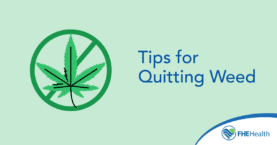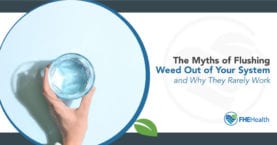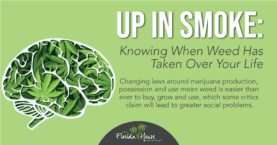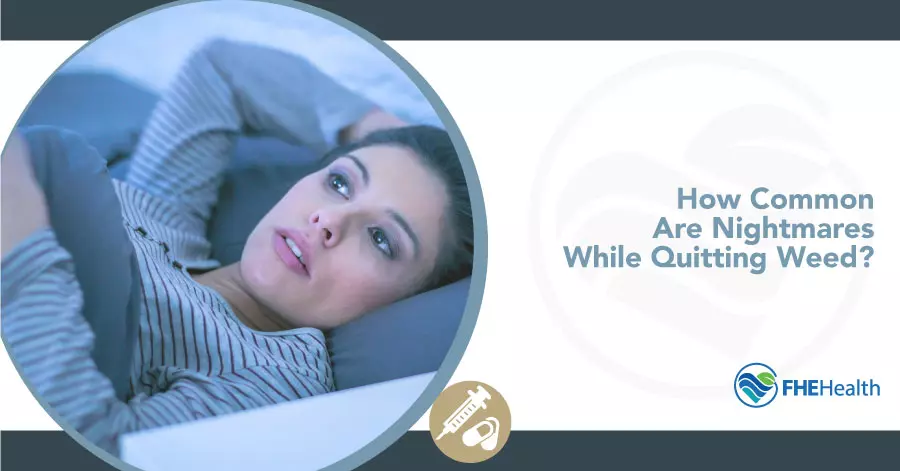
Although withdrawal symptoms from cannabis aren’t as severe as withdrawal symptoms from quitting opioids or alcohol, they are still unpleasant and disruptive to your health. And, for people who smoke marijuana every day, the withdrawal symptoms can be more pronounced and uncomfortable, including cannabis-related night sweats and intense dreams. Read on to learn more about this less-known feature of quitting weed and why it’s worth knowing about….
Does Quitting Marijuana Cause Nightmares?
Is there a connection between nightmares, dreams and weed abstinence? According to research, there appears to be a connection attributed to neurobiological findings emerging from the discovery of the brain’s cannabinoid receptor system. Cannabis Withdrawal Syndrome (CWS) now included in the DSM-5, is a clinically recognized syndrome comprised of a constellation of symptoms affecting heavy pot smokers who quit weed. Criteria for diagnosing CWS include:
- Irritability/anger
- Aggression
- Lack of appetite
- Anxiety/nervousness
- Depression
- Insomnia
- Disturbing dreams (these can be true nightmares or merely vivid dreams)
Physical signs of cannabis withdrawal syndrome include stomach pain, night sweats, chills, low-grade fever, and shakiness. Researchers aren’t sure if intense dreaming after quitting weed is due to the symptoms themselves, disruption of neurotransmitter release within the brain’s sleep center or a combination of both.
How Marijuana Affects the Brain
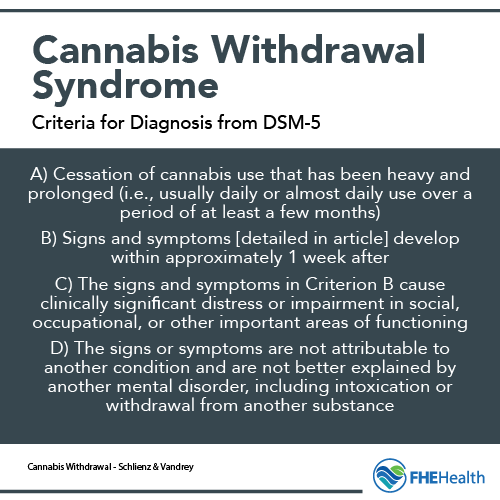 The reason why the brain has receptors designed specifically for marijuana chemicals is that the brain actually produces cannabinoid substances similar to pot’s psychoactive ingredients. Cannabinoids are naturally made in the cortex, an area of the brain that guides movement, processes thoughts and emotions and interprets sensory information.
The reason why the brain has receptors designed specifically for marijuana chemicals is that the brain actually produces cannabinoid substances similar to pot’s psychoactive ingredients. Cannabinoids are naturally made in the cortex, an area of the brain that guides movement, processes thoughts and emotions and interprets sensory information.
Anandamide is an important endogenous cannabinoid that functions as a neurotransmitter in the brain. Anandamide facilitates chemical messaging among neurons and the central nervous system nerve cells. Because marijuana’s primary psychoactive chemical THC is so comparable molecularly to anandamide and other cannabinoids, THC easily infiltrates and activates cannabinoid receptors.
Disruption of normal cannabinoid receptor activity causes the mental and physical effects of a pot “high.” In addition, smoking pot increases levels of dopamine and serotonin, two neurotransmitters implicated in sleep, mood and pleasure. The brains of daily marijuana smokers eventually develop a tolerance to excessive serotonin and dopamine levels, which forces the brain to reduce its natural release of these two chemicals. Consequently, having intense dreams after quitting weed could be due to a lack of serotonin and dopamine in the brain.
What Are Dreams and Why Would Detox from Weed Cause Nightmares?
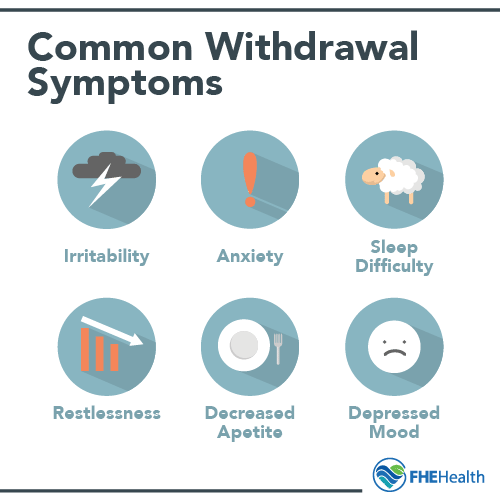 No definitive answer exists for the question of why humans and mammals dream. A general consensus among sleep researchers posits that dreams are current or near-current autobiographical events interacting with memories to create surreal plays in which dreamers often find themselves the main character. Neuroscientists think that dreams may be the way the brain de-clutters and reorganizes itself while the body rests. Proponents of psychoanalysis speculate dreams arise from the subconscious frustrations and desires that dreamers remain unaware of during consciousness.
No definitive answer exists for the question of why humans and mammals dream. A general consensus among sleep researchers posits that dreams are current or near-current autobiographical events interacting with memories to create surreal plays in which dreamers often find themselves the main character. Neuroscientists think that dreams may be the way the brain de-clutters and reorganizes itself while the body rests. Proponents of psychoanalysis speculate dreams arise from the subconscious frustrations and desires that dreamers remain unaware of during consciousness.
Unlike pleasant or nondescript dreams happening throughout the REM sleep cycle, nightmares tend to occur towards the end of the REM sleep cycle. This means you are probably having a bad dream right before you wake up. This is why we can vividly remember the terrifying images and events of a disturbing nightmare.
Withdrawal symptoms from cannabis may include frequent nightmares simply because the brain is essentially re-wiring itself to adapt to normal neurotransmitter levels. In addition, depression is known to promote nightmares, due to a disruption of neurotransmitter levels. Depression is one of the most common symptoms reported by people detoxing from marijuana.
Can You Avoid Having Nightmares When Quitting Weed?
While it’s not guaranteed to stop intense dreams after quitting weed, a medical detoxification program may reduce the number of nightmares by providing detox patients with medications meant to alleviate symptoms of cannabis withdrawal syndrome. Depending on how much weed a person smoked will determine how long they continue having nightmares as well as the vividness of their nightmares.
Is It Difficult to Detox from Weed?
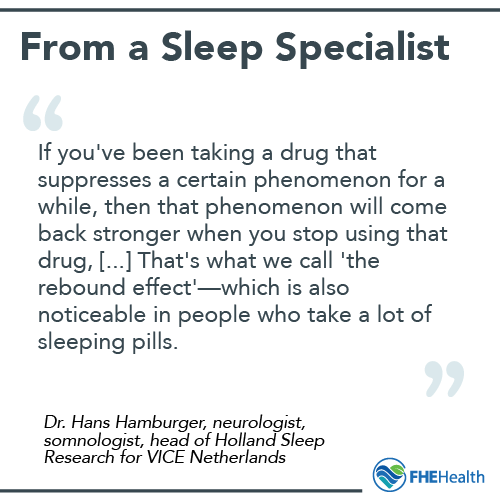 Again, this depends on the severity of marijuana dependence. Someone who has smoked only one joint every day for six months may not experience withdrawal symptoms acute enough to force them to start using again. Alternately, a person who has smoked over three joints a day for six months will probably need to enter a medical detoxification program to successfully abstain from smoking pot.
Again, this depends on the severity of marijuana dependence. Someone who has smoked only one joint every day for six months may not experience withdrawal symptoms acute enough to force them to start using again. Alternately, a person who has smoked over three joints a day for six months will probably need to enter a medical detoxification program to successfully abstain from smoking pot.
Although no medications have been approved by the FDA specifically for treating marijuana addiction, some medications are currently being researched to determine if they can help reduce nightmares and sleep difficulties affecting people detoxing from pot.
Ambien, a drug widely prescribed for insomnia, and buspirone, an anti-anxiety medication, may one day be approved as pot addiction medications by the FDA. Nutritional supplements N-acetylcysteine and FAAH inhibitors may decrease severity of cannabis withdrawal syndrome symptoms by preventing breakdown of cannabinoids naturally produced by the body.
Counseling and psychotherapy used to treat a marijuana addiction include:
Cognitive Behavioral Therapy (CBT) – identifies and corrects negative thinking patterns and beliefs that contribute to an addiction. CBT is invaluable to helping a person strengthen their self-control and cope with stress-causing “triggers” that increase cravings and the urge to use again.
Family Therapy – Substance addiction should not be considered an individual problem but a family issue involving communication problems, unresolved conflicts and other dysfunctional aspects. Family therapy is especially useful for treating adolescents or young adults addicted to pot who are still living with their parents.
Motivational Enhancement Therapy (MET) – an interventional form of therapy, MET is meant to promote rapid motivation in patients by teaching them how to strengthen their own psychological resources. Engagement, change and motivation are the cornerstones of MET.
Signs of a Marijuana Addiction – When to Seek Treatment
An addiction to pot is sometimes hard to recognize. Unlike heroin, cocaine or meth addictions, a pot addiction does not always interfere with a person’s ability to remain employed and live what appears to be a “normal” lifestyle. Possible signs of a marijuana problem include but are not limited to:
- Being high several hours every day
- Driving while high/driving while smoking pot
- Craving pot when it isn’t readily available
- Having only “stoner” friends/avoiding people who don’t smoke pot
- Selling marijuana to finance an addiction
- Staying employed but having no motivation for doing anything else but smoke pot
- Developing a tolerance for pot/needing to smoke several joints instead of one to get high
- Problems with short-term memory/forgetting appointments/inability to concentrate
- Encounters with law enforcement/getting arrested for possession and/or selling pot
Read more on ‘Has Weed Taken Over My Life‘
If you or someone you know has tried to quit weed but couldn’t because of intense withdrawal symptoms, call FHE Health today to learn more about our inpatient and outpatient pot addiction programs.
